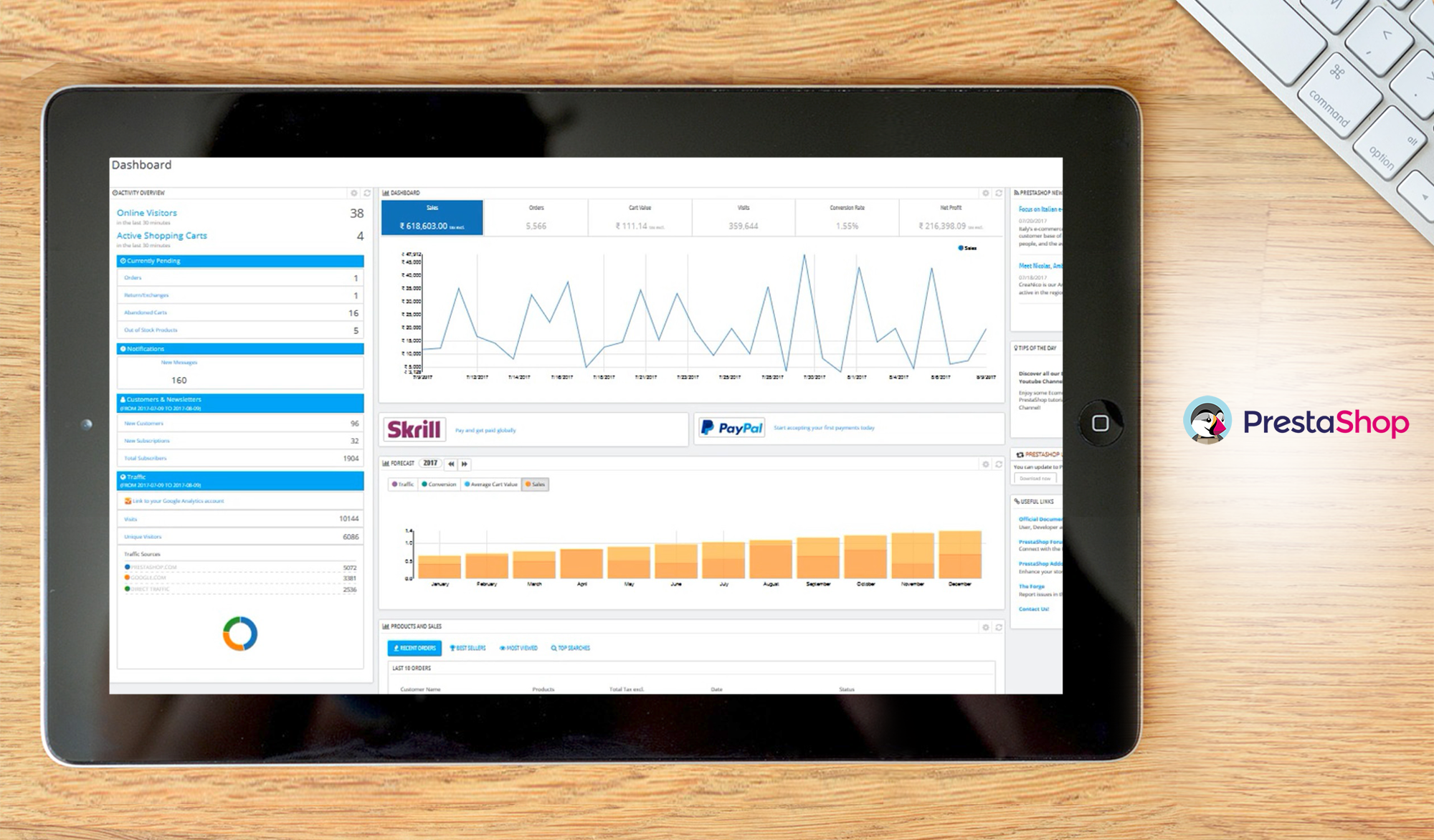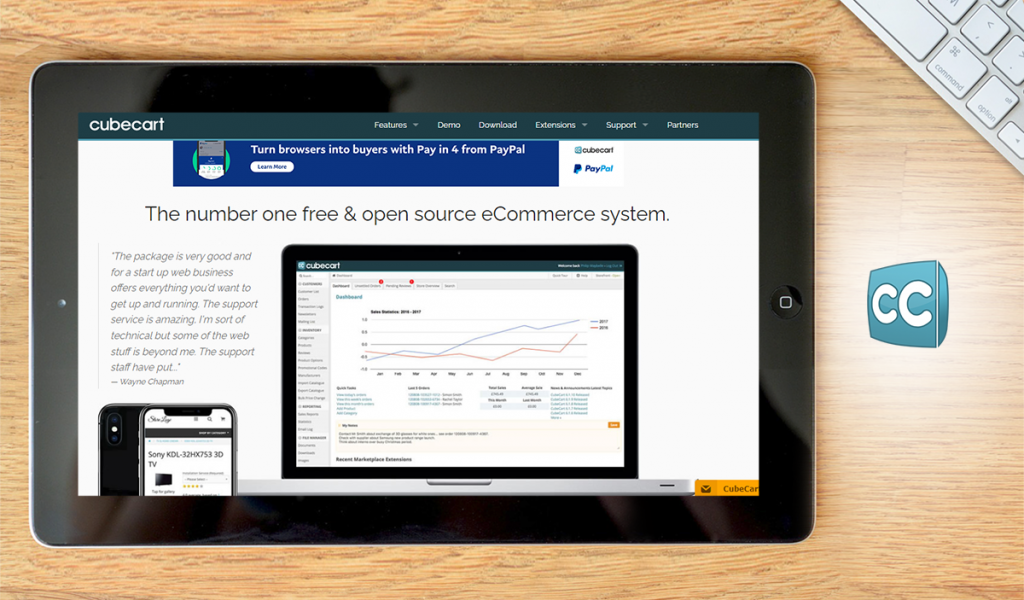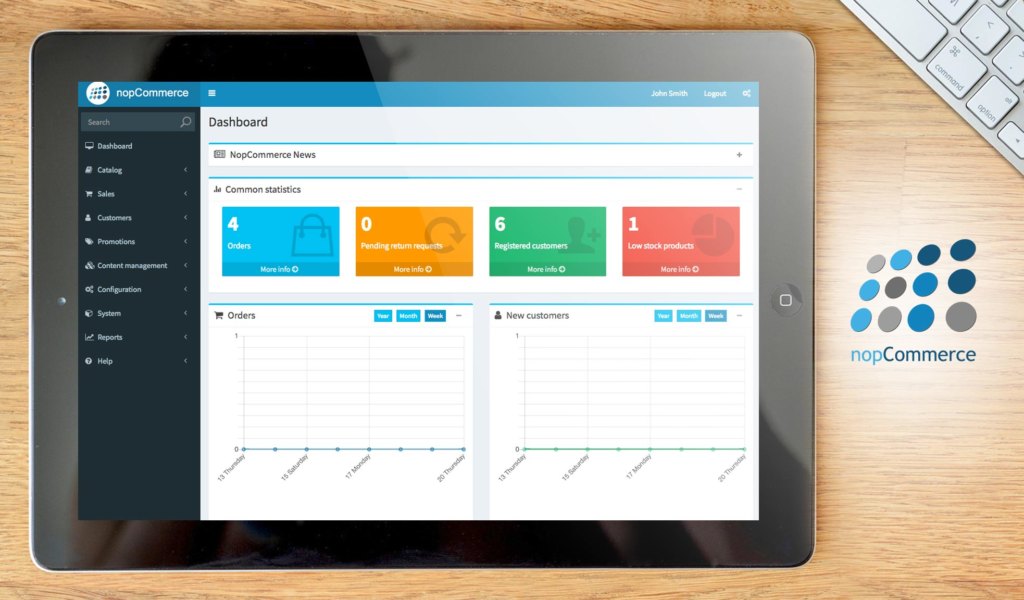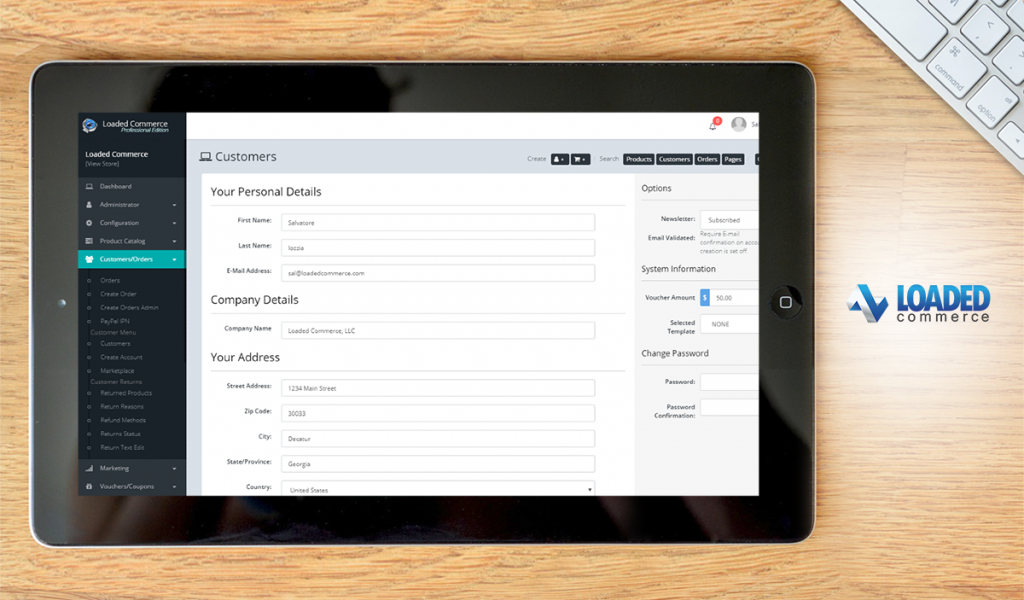Is opening an online store something you’d like to do, but limited funds is holding you back? Open source shopping cart software may be preferable to proprietary solutions. While most open source solutions are available for free, this does not mean that they are lacking in features. When compared to commercially available shopping cart software, open source options typically benefit from a more rapid pace of feature development due to the larger number of people working on it. In fact, you can build an entire web store using open source ecommerce software.
You should be aware that most of these shopping carts assume some familiarity with web hosting basics, like cPanel before you start. Each of these tools, however, comes with its own comprehensive documentation, so even if you aren’t very tech smart, you won’t have any trouble using them. And if that’s not enough, you can always resort to their community forums for support. Check out the best open source shopping cart software options below to kickstart your online store.

Best Open Source Shopping Cart Software in 2026 Table of Contents
The rise of easy-to-use online solutions, along with the demand for a convenient way to shop, has given rise to the ecommerce industry. Combined with technologies such as payment gateways, shipping systems, and more, it has never been this easy to set up an online store. Doing so can do wonders for your business as experts estimate the total global ecommerce sales to reach $4.9 trillion in value.
Just like any industry, the ecommerce sector was also affected by the pandemic, albeit in a more positive way. As people stayed at home, they began to rely on online shopping portals for their needs. At the same time, retailers and developers have improved many aspects of the online shopping experience, such as better accessibility through mcommerce, more efficient logistics, and much more. As a result, experts are expecting the industry to balloon to $7.4 trillion by 2025.
Source: eMarketer, 2021
More and more individuals and organizations are setting up their online stores in order to enjoy a slice of the huge ecommerce pie. Unsurprisingly, Amazon is still leading the pack, with almost 40% of the United States ecommerce sales conducted on the platform. As such, it remains a favorite among retailers due to its ease of use and other functionalities. However, many organizations are also opting to launch their own online portals with the help of open source solutions. Are you curious to see what options are available out there? The open source shopping cart comparison below will provide you with insights about key features and functionalities that will fit your business best.
Best Open Source Shopping Cart Software
1. X-Cart

Ecommerce businesses can benefit greatly from X-Cart since it is a fully customizable shopping cart that provides a wide range of useful features and integration capabilities. As a result of its flexible licensing options, it’s a great pick for anyone wishing to launch an online marketplace, from sole proprietors to rapidly expanding enterprises. It provides both a hosted service with full management and an on-premises solution that can be downloaded.
The platform can monitor products based on their variety, ensuring that vendors never advertise goods that they do not currently have available for sale. Top selling and limited stocks can also be viewed, providing retailers with an idea of what they should stock up on. Digital goods can also be sold using the system, while auction capabilities allow customers to bid on particular items. More than that, the software is robust enough to manage well over a million SKUs without any issues at all. In other words, X-Cart can handle your inventory requirements no matter how large they are.
Detailed X-Cart Review
2. WooCommerce

WooCommerce is a powerful online store management system and one of the most popular solutions around the world. It’s a WordPress plugin that will transform your site into a robust ecommerce platform and includes an open source PHP shopping cart. Any kind of product, digital or physical, membership or appointment, can be sold in unlimited quantities on a WooCommerce-powered website. The solution is adaptable since it is open source and has more than 350 contributors worldwide. If you’re a developer, you’ll love how flexible it is, as it supports more than 400 add-ons. Other WordPress plugins can also be readily incorporated.
Furthermore, WooCommerce allows you to set up your store to support several languages, a wide range of currencies, and the automatic calculation of local taxes from various payment methods. Using a plugin like WooCommerce Multilingual, for instance, might make it much simpler for you to sell your products in other regions. WordPress’s pre-existing capabilities and a plethora of integrations make it easy to launch or transform an existing online store. The Setup Wizard makes it easy to take advantage of many of the available integrations at no cost.
Detailed WooCommerce Review
3. PrestaShop

When it comes to online storefronts, PrestaShop is a great choice because it offers both a self-hosted and an open source option. Since PrestaShop is an open source platform, you can access the source code for any of its themes and make any modifications you like. This flexibility will help your store stand out from the competition by allowing you to create a one-of-a-kind UI and design. While PrestaShop gives you a lot of leeway, it also provides you with more than 3,000 templates to work with as a jump-off point for creating a unique look for your store.
The platform is available at no cost and can be used in theory without any additional components. You’ll have to make do with PrestaShop’s basic standard theme if you don’t want to shell out any cash at any point. Since it’s open source, you can modify the code for the default theme, whatever you choose, and you still receive all the listing, marketing, and selling tools. It works with several well-known payment processors, including PayPal and Amazon Pay. It also allows you to choose from over 200 different providers through add-ons. Since PrestaShop Checkout is an integral part of the platform itself, clients are never diverted away from the PrestaShop domain for the purpose of making a purchase, which can be a major trust-breaker. In addition to the security features already mentioned, PrestaShop also includes a free SSL certificate that is PCI compliant.
Detailed PrestaShop Review
4. OpenCart

OpenCart is a free, open source shopping cart software that offers extensive configuration options. It offers a comprehensive dashboard for administrators, allowing for quick and easy access to key performance indicators, including sales, customers, and more. It also features a multi-store capability that enables you to remain on top of different stores from a single interface. With this feature, you may localize your website content and your storefront, and set products for separate online stores. OpenCart also provides a great deal of leeway in terms of product customization choices and attributes, allowing for the addition of new product factors.
Additionally, just like the majority of other ecommerce platforms, OpenCart is highly modifiable and extensible. More than 13,000 plugins, skins, and themes are at your disposal. OpenCart is a solution that requires you to install it yourself (or have someone on your team do so). Thus it’s best for companies whose employees already have some familiarity with web design and development basics. OpenCart, on the other hand, can be picked up quickly due to its user-friendly interface and streamlined operation. All the features you need to launch your business and begin selling are included right out of the gate.
Detailed OpenCart Review
5. CubeCart

If you’re looking for a reliable ecommerce solution that has everything you need to start selling online, go no further than CubeCart. CubeCart’s combination of robust functionality and zero up-front cost makes it a great choice for small and medium-sized enterprises, as well as sole proprietors, in need of an ecommerce solution. It’s purposely stripped down, but it offers everything most retailers need to process orders. It can be readily customized and expanded because of its abundant code hooks.
The platform’s quick and easy installation can be attributed to the inclusion of a set-up wizard. Quickly create a polished look for your online shop with the aid of accessible storefront design templates, and improve the performance of your product pages using picture cropping and resizing options. It’s easy for shoppers to find what they’re looking for, thanks to the store’s search engine optimization (SEO) and detailed product descriptions, and zoom functions. Managing and adjusting product prices in bulk simplifies back-end store management.
Detailed CubeCart Review
6. Ecwid

Ecwid is a web-based ecommerce platform ideal for companies and individuals with already established websites. Unlike competing systems, Ecwid lets customers set up shop on their own domains rather than starting from scratch. Adding a few lines of code in HTML or JavaScript to your website is all that’s required for set-up. Instead of spending a ton of time and money developing a dedicated ecommerce website, you can simply integrate your Ecwid store into your existing website.
The solution not only offers incredibly responsive stores but also the convenience of creation and installation. Your Ecwid ecommerce platforms will function flawlessly across all platforms and gadgets. All of your items and catalogs look great on desktop computers, laptops, and mobile devices. Ecwid also provides a point-of-sale feature that allows you to take payments from Apple devices, as well. Taking payments has never been easier, whether at a concert, in a shopping mall, a store, or a market.
Detailed Ecwid Review
7. CS-Cart Multi-Vendor

For anyone interested in creating an online marketplace like Etsy or eBay but without the hassle of dealing with a third-party host, CS-Cart Multi-Vendor is the perfect solution. It may be used to market everything from homemade soap to custom software. Since Multi-Vendor is open source, it can be modified to include whatever features you require. Over 80 different payment and shipping method integrations are included in Multi-Vendor, along with a mobile-friendly design, a powerful content management system, a suite of marketing tools, a loyalty framework, excellent search engine optimization, and a one-of-a-kind feature called the Layout Editor. The content of your marketplace pages can be modified with a simple drag-and-drop interface, thanks to this platform.
In addition, CS-Cart Multi-Vendor has a user-friendly control panel that is pre-installed. The menus are positioned in the most optimal locations for quick and easy access. Any preference can be accessed in no more than three clicks. You can learn the ropes of the control panel in under two hours, and navigating it is child’s play. It’s user-friendly, so your team won’t waste any time learning it.
Detailed CS-Cart Multi-Vendor Review
8. Magento Open Source

Magento Open Source is an ecommerce platform that is both powerful and flexible in terms of features and tools, giving businesses a great deal of leeway in terms of shop configuration and management. It’s easy to see why so many companies select Magento as their ecommerce platform; it has a long history of success and offers seamless interaction with eBay. Magento’s enterprise-level features and technologies can help you improve your online shop. The platform can be easily and rapidly scaled to meet the needs of a growing firm. You’ll find all the features helpful as your company expands.
On top of that, Magento’s HTML5 interface works on all mobile devices, including iOS and Android. You have the option of developing a branded mobile site that is connected to your main website. Customers can use pinch-to-zoom and swipe gestures, among other navigational aids. Magento Connect also lets you create add-ons for your store, which can be used to better serve your consumers. In addition, your inventory and individual website administration can also be enhanced.
Detailed Magento Review
9. Zen Cart

Zen Cart is a PHP/MySQL-based open source ecommerce shopping cart solution that does not cost anything to use. Because the source code of Zen Cart is completely modifiable, everyone who uses it has the ability to tweak, alter, or develop the program to meet the specific requirements of their company as well as their personal tastes. Zen Cart is a strong competitor in the shopping cart industry because of the robust features and services it provides. It is commonly favored over a number of commercial carts that are now offered for sale on the market.
Additionally, smooth connections with widely used gateways are offered by the system. This means that as soon as your website is ready, you will be able to immediately begin receiving payments. In addition to its existing integration, you can implement a custom module by choosing one of the hundreds of payment modules that have been contributed by the community or by using those modules as a starting point for developing your own. Zen Cart is compatible with all web hosting providers and enables you to make use of a domain name of your choosing.
Detailed Zen Cart Review
10. nopCommerce

nopCommerce offers users a configurable shopping cart, a catalog interface, and an admin tool for monitoring and management. This system has been downloaded over 2.5 million times, making it an excellent option for ecommerce firms and SMBs that have outgrown their current solutions. Built on an open source framework, this software can be modified to better meet the requirements of individual companies.
The platform ensures that your online store is completely functioning and mobile-friendly. You can use a single installation of nopCommerce to power several stores. Utilize the drop shipping and multi-vendor capabilities to expand your product offering beyond what you currently stock. Everything from websites to online shops, will have its search engine optimization (SEO) settings fine-tuned for maximum exposure and ranking. With nopCommerce’s mobile commerce capabilities, developers can easily create ecommerce apps for use on tablets and smartphones. Retailers with more than one location can use the product to keep tabs on all of their stores’ categories, suppliers, items, prices, orders, and shipments in one place. In addition to managing sales and tax, users can simultaneously monitor the status of their retail outlets.
Detailed nopCommerce Review
11. Spree Commerce

Spree Commerce‘s streamlined set of fundamental capabilities, which can be tailored to your needs, makes it a good choice if you want to build and promote an online store quickly. The platform is a bit technical because it was developed with Ruby on Rails, so you may need to have at least a basic understanding of programming or engage a professional designer and developer to help you build and launch your site. However, this means you have complete control of your entire site, from features to frontend layout.
Multiple storefronts, an analytics dashboard, search engine optimization (SEO) tools, and inventory management systems are just some of the capabilities that can be found on the platform. Once you have Spree up and running, you’ll find the administrative interface straightforward and easy to use. The interface is clean and straightforward. Advanced options can be quickly accessed via the sidebar’s collapsible menus. The fundamentals of how to do everything are clearly laid out. The rate at which the site loads is entirely dependent on the hardware you’re using. However, the app’s low resource requirements mean that even a well-used server won’t see a significant slowdown.
Detailed Spree Commerce Review
12. osCommerce

osCommerce is a simple and intuitive ecommerce and online store management software that can be deployed on any website that already has PHP and MySQL installed. osCommerce can also be used to run offline stores. Users are given access to a variety of capabilities when they make use of the self-hosted software, such as payment processing, technical assistance, and support for many currencies. The program can also be implemented on websites or web servers, which is another useful feature. It can be downloaded and installed for free, but in order to make enhanced alterations, you will need to have some knowledge of development. Additionally, because it is more difficult to scale, it is best suited for use by smaller organizations.
The osCommerce community has contributed more than 9,000 add-ons that are completely free to install and use. These add-ons enable users to make the most of the osCommerce ecosystem without having to spend more. As an added convenience, the vendor provides osCommerce server hosting for online stores, saving businesses time and energy that would otherwise be spent looking for an appropriate host. This also means that there is minimal set-up and server configuration required, which makes it simple for any organization to begin operating an online store.
Detailed osCommerce Review
13. AbanteCart

The AbanteCart ecommerce platform is a free and open source software that lets you set up an online store. Thanks to the platform’s support for numerous storefronts and responsive design, customers can access your business from any mobile device. AbanteCart’s stock tracking tool can be configured to keep tabs on your product stock. Customers will easily browse your store if products are organized into many categories, such as brand, type, price, etc. Your product information can be imported in bulk, so you can begin using the platform right away.
In addition, AbanteCart guarantees that your consumers will have a positive experience when they shop with you. This platform makes it possible for customers to save their wish lists and keeps track of their orders for complete transparency. They also have the ability to calculate their balance and finish transactions. Plus, this platform supports multiple languages, so you may respond to questions from clients all over the world.
Detailed AbanteCart Review
14. Drupal Commerce

Drupal Commerce is a free and open source framework for building ecommerce sites and apps on the Drupal content management system. By bringing together the power of ecommerce, curated content, and social interaction, this cutting-edge piece of software helps e-tailers increase their customer base and sales. It also provides tools for creating an administration system and configurable procedures, making it possible for non-technical staff to design and implement changes and experiment with new ideas without in-depth knowledge of IT.
On top of that, Drupal Commerce is very adaptable and flexible, so you can shape it for your business rather than the other way around. It is the optimal solution for both physical and non-physical goods that require specific payment models to be used (i.e., recurring, subscription, tiered, etc.) It also comes with numerous modules to extend your online store’s capabilities, such as payment modules, analytics, shipping, and much more.
Detailed Drupal Commerce Review
15. Loaded Commerce

Loaded Commerce is a free, opensource shopping cart solution for running an online store. Because it is open source, users can modify it to their specific business requirements and aesthetic preferences. It also has mobile-friendly storefront themes that adapt to the device’s screen size. Its CK Editor also makes modification easy and quick without the need for extensive coding knowledge. Along with other frontend elements such as lightbox, navigation, and content director system, you can launch a custom website that is consistent with your brand.
While the Community Edition is completely free, it does not fall short of powerful features. It comes packaged with free shipping modules that can accommodate FedEx, UPS, and USPS. Loaded Commerce also includes a CRE Secure PCI Compliant payment gateway, ensuring that you can accept secured payments immediately. For businesses that need advanced features, the vendor offers its Pro and B2B versions at affordable prices.
Detailed Loaded Commerce Review
How to Customize Open-Source Shopping Cart Software for Your Brand
Customizing open-source shopping cart software allows businesses to align their online store with their brand identity. Here are key steps to make your shopping cart unique:
- Choose a Flexible Theme: Many open-source shopping cart platforms offer a range of customizable themes. Start by selecting one that matches your brand’s aesthetic. Modify colors, fonts, and layouts to make the look and feel consistent with your brand.
- Add Branding Elements: Integrate your logo, slogans, and brand colors throughout the shopping cart. Custom banners and product labels add a personal touch and reinforce brand recognition across all pages.
- Customize Product Pages: Tailor product descriptions, images, and layouts to enhance the shopping experience. Use high-quality visuals and ensure that descriptions are detailed yet concise, guiding customers effectively through their buying journey.
- Integrate Unique Features: Consider adding plugins or modules for features like product recommendations, wishlist options, and personalized offers. These can enhance the user experience and differentiate your store from competitors.
- Optimize Checkout Process: Streamline the checkout process by customizing the steps to make it simple and user-friendly. Ensure that the branding is consistent and that your customers feel secure by adding trust badges and a clear return policy.
More Freedom with Open Source Shopping Cart Software
These days, launching an ecommerce portal is not only advantageous but can be considered a requirement. Fortunately, this can be done at a minimal cost. Open source solutions, from shopping carts to payment gateways, usually come packaged with most ecommerce software in the market. Furthermore, many of these shopping cart software can be customized to perfectly fit your store.
Among the numerous open source shopping cart software in the market, we particularly like X-Cart. Because it is fully customizable, the application is easy to integrate into any existing online store. Furthermore, it integrates with many systems that you need to run an ecommerce business, such as CRM, email marketing software, SEO tools, and more. X-Cart shows that open source solutions are not only viable but competitive options as well.
Key Insights
- Customizability: Open source shopping cart software like X-Cart, WooCommerce, and PrestaShop offer extensive customization options, allowing businesses to tailor their online stores to their specific needs.
- Cost-Effectiveness: Most open source solutions are free, providing a cost-effective alternative to proprietary software while still offering robust features and functionalities.
- Community Support: These platforms benefit from large, active communities that contribute to rapid feature development and provide extensive support and documentation.
- Integration Capabilities: Leading open source shopping carts integrate seamlessly with various payment gateways, analytics tools, CRM systems, and more, ensuring a comprehensive ecommerce solution.
- Scalability: Solutions like Magento and CS-Cart Multi-Vendor are designed to scale, making them suitable for both small businesses and large enterprises.
- Ease of Use: Many of these platforms, such as OpenCart and CubeCart, provide user-friendly interfaces and setup wizards, making them accessible even to users with limited technical knowledge.
- Security: Open source shopping carts typically include built-in security features, such as SSL certificates and PCI compliance, to ensure safe transactions.
- Flexibility in Deployment: Options like X-Cart and Ecwid offer both hosted and self-hosted solutions, giving businesses the flexibility to choose the deployment method that best suits their needs.
FAQ
- What are the advantages of using open source shopping cart software over proprietary solutions? Open source shopping cart software is typically free, highly customizable, and benefits from community-driven development and support. This allows for faster implementation of new features and fixes. Additionally, businesses have full control over their software and can modify it to meet their specific needs without being tied to a single vendor.
- How difficult is it to set up and use open source shopping cart software? While some familiarity with web hosting basics (like cPanel) is beneficial, many open source shopping carts come with comprehensive documentation and setup wizards to simplify the process. Additionally, active community forums can provide support and assistance for new users.
- Can open source shopping cart software integrate with other tools and systems? Yes, most open source shopping cart solutions offer extensive integration capabilities. They can connect with payment gateways, CRM systems, email marketing tools, SEO tools, and other essential ecommerce software, providing a comprehensive solution for online businesses.
- Is open source shopping cart software secure? Yes, reputable open source shopping cart platforms include robust security features, such as SSL certificates and PCI compliance, to ensure secure transactions. Regular updates and community vigilance also contribute to maintaining high security standards.
- Are there any costs associated with using open source shopping cart software? While the software itself is usually free, there may be costs associated with hosting, premium themes or plugins, and professional services for customization or technical support. However, these costs are often lower than those of proprietary solutions.
- Can I scale my business using open source shopping cart software? Absolutely. Many open source shopping cart platforms, like Magento and CS-Cart Multi-Vendor, are designed to handle large-scale operations and can support the growth of your business with advanced features and scalability options.
- What support options are available for open source shopping cart software? Support options vary by platform but generally include comprehensive documentation, active community forums, and sometimes professional support services offered by third-party providers or the platform developers themselves.


























Leave a comment!